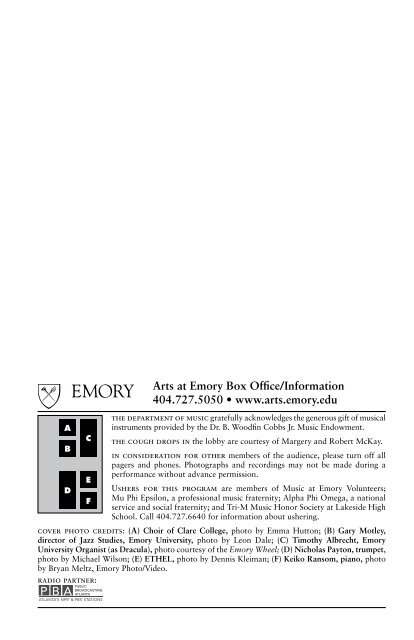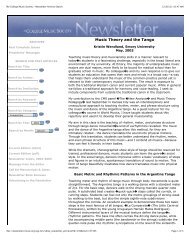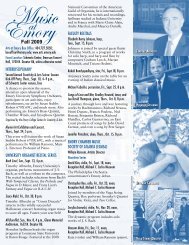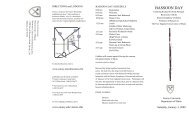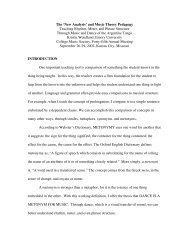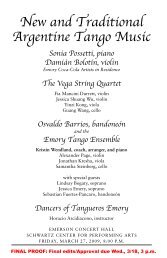3_23_11 Tango Concert - Music at Emory - Emory University
3_23_11 Tango Concert - Music at Emory - Emory University
3_23_11 Tango Concert - Music at Emory - Emory University
You also want an ePaper? Increase the reach of your titles
YUMPU automatically turns print PDFs into web optimized ePapers that Google loves.
A<br />
B<br />
D<br />
C<br />
E<br />
F<br />
Arts <strong>at</strong> <strong>Emory</strong> Box Office/Inform<strong>at</strong>ion<br />
<br />
the department of music gr<strong>at</strong>efully acknowledges the generous gift of musical<br />
instruments provided by the Dr. B. Woodfin Cobbs Jr. <strong>Music</strong> Endowment.<br />
the cough drops in the lobby are courtesy of Margery and Robert McKay.<br />
in consider<strong>at</strong>ion for other members of the audience, please turn off all<br />
pagers and phones. Photographs and recordings may not be made during a<br />
performance without advance permission.<br />
Ushers for this program are members of <strong>Music</strong> <strong>at</strong> <strong>Emory</strong> Volunteers;<br />
Mu Phi Epsilon, a professional music fr<strong>at</strong>ernity; Alpha Phi Omega, a n<strong>at</strong>ional<br />
service and social fr<strong>at</strong>ernity; and Tri-M <strong>Music</strong> Honor Society <strong>at</strong> Lakeside High<br />
School. Call 404.727.6640 for inform<strong>at</strong>ion about ushering.<br />
cover photo credits: (A) Choir of Clare College, photo by Emma Hutton; (B) Gary Motley,<br />
photo by Leon Dale; (C) Timothy Albrecht, <strong>Emory</strong><br />
photo courtesy of the <strong>Emory</strong> Wheel; ,<br />
photo by Michael Wilson; (E) ETHEL, photo by Dennis Kleiman; photo<br />
by Bryan Meltz, <strong>Emory</strong> Photo/Video.<br />
radio partner:
Argentine<br />
<strong>Tango</strong> <strong>Music</strong><br />
<strong>Tango</strong> Orchestra Club Atlanta<br />
Osvaldo Barrios, bandoneón<br />
Howard Goldstein, violin<br />
Noemi Kurylo, cello<br />
Todd Markey, double bass<br />
Mary McCoy, violin/viola<br />
Ronald Mendoza-de Jesús, singer<br />
Kristin Wendland, piano and director<br />
<br />
<br />
and the<br />
<strong>Emory</strong> <strong>Tango</strong> Ensemble<br />
William Eye, violin<br />
Sarah Earp, viola<br />
Gina Florio, piano<br />
Samantha Greene, double bass<br />
Jon<strong>at</strong>han Lin, violin<br />
K<strong>at</strong>hryn Vance, violin<br />
Kristin Wendland, coach<br />
EMERSON CONCERT HALL<br />
SCHWARTZ CENTER FOR PERFORMING ARTS<br />
WEDNESDAY, MARCH <strong>23</strong>, 20<strong>11</strong>, 8:00 P.M.
2<br />
!"#$"%&<br />
Classic <strong>Tango</strong>s for Dancing<br />
9 de Julio José Luis Padula<br />
(1893–1945)<br />
Canaro en Paris Alejandro Scarpino<br />
(1904–1970)<br />
Francia, vals Octavio Barbero<br />
(unknown–1948)<br />
La trampera, milonga Anibal Troilo<br />
(1914–1975)<br />
La yumba Osvaldo Pugliese<br />
(1905–1995)<br />
La cumparsita Hernán M<strong>at</strong>os Rodriguez<br />
(1897–1948)<br />
Canciones from <strong>Tango</strong>!s Golden Age<br />
Yira yira Enrique Santos Discepolo<br />
(1901–1951)<br />
Nada José Dames<br />
(1907–1994)<br />
Horacio Sanguinetti<br />
(1914–1957)<br />
Si soy asi Francisco Lomuto<br />
(1893–1950)<br />
Antonio Botta<br />
(1896–1969)
Que solo estoy Raúl Kaplún<br />
(1910–1990)<br />
Roberto Miró<br />
(n.d.)<br />
Pa’ que bailen los muchachos Aníbal Troilo/Enrique Cadícamo<br />
(1900–1999)<br />
<strong>Concert</strong> <strong>Tango</strong>s<br />
Che, bandoneón! Troilo<br />
A fuego lento Horacio Salgán<br />
(b. 1916)<br />
Don Agustín Bardi Salgán<br />
Oblivión Astor Piazzolla<br />
(1921–1992)<br />
Vuelvo al sur Piazzolla<br />
Fernando “Pino” Solanas<br />
(b. 1936)<br />
Danzarín Julián Plaza<br />
(1928–2003)<br />
La bordona Emilio Balcarce<br />
(1919–20<strong>11</strong>)<br />
Special thanks to the Friends of <strong>Music</strong> for their continued support of tango artist Osvaldo Barrios.<br />
3
Cuando la suerte qu’ es grela,<br />
fayando y fayando<br />
te largue parao;<br />
cuando estés bien en la vía,<br />
sin rumbo, desesperao;<br />
cuando no tengas ni fe,<br />
ni yerba de ayer<br />
secándose al sol;<br />
cuando rajés los tamangos<br />
buscando ese mango<br />
que te haga morfar . . .<br />
la indiferencia del mundo<br />
–que es sordo y es mudo–<br />
recién sentirás.<br />
Verás que todo el mentira,<br />
verás que nada es amor,<br />
que al mundo nada le importa . . .<br />
¡Yira! ¡Yira!<br />
Aunque te quiebre la vida,<br />
aunque te muerda un dolor,<br />
no esperes nunca una ayuda,<br />
ni una mano, ni un favor.<br />
Cuando estén secas las pilas<br />
de todos los timbres<br />
que vos apretás,<br />
buscando un pecho fr<strong>at</strong>erno<br />
para morir abrazao . . .<br />
Cuando te dejen tirao<br />
después de cinchar<br />
lo mismo que a mí.<br />
Cuando manyés que a tu lado<br />
se prueban la ropa<br />
que vas a dejar . . .<br />
Te acordarás de este otario<br />
que un día, cansado,<br />
¡se puso a ladrar!<br />
4<br />
'()*+,%-.,'"%-+/%*0#-+<br />
Yira yira Cruisin!, cruisin!<br />
When luck which is very bad<br />
missing and missing, leaves you alone,<br />
When you’re well on the way<br />
Without direction, desper<strong>at</strong>e<br />
When you don’t even have faith<br />
Nor yesterday’s herbs (m<strong>at</strong>e)<br />
Drying in the sun<br />
When you split the dancing shoes<br />
Looking for dough<br />
To be able to e<strong>at</strong><br />
The world’s indifference<br />
Which is deaf and dumb<br />
You will then feel.<br />
You’ll see th<strong>at</strong> everything is a lie<br />
You’ll see th<strong>at</strong> nothing is love<br />
Th<strong>at</strong> the world doesn’t care<br />
Cruisin’, cruisin’<br />
Even if life breaks you<br />
Even if pain bites you<br />
Don’t ever expect help<br />
Nor a hand . . . Nor a favor<br />
When the b<strong>at</strong>teries<br />
Of all the bells you ring,<br />
have dried up,<br />
In search of a fr<strong>at</strong>ernal chest<br />
To die in an embrace<br />
When they leave you alone<br />
After cinching<br />
As happened to me<br />
When you notice th<strong>at</strong> right next to you<br />
They’re trying on the clothes<br />
Th<strong>at</strong> you will leave,<br />
You will remember this otario<br />
Th<strong>at</strong> one day, tired<br />
Started to bark<br />
Even if life breaks you<br />
Even if pain bites you<br />
Don’t ever expect help<br />
Nor a hand . . . Nor a favor<br />
—transl<strong>at</strong>ed by Frank Sasson<br />
ed. by Ronald Mendoza de Jesús
'()*+,%-.,'"%-+/%*0#-+<br />
Nada Nothing<br />
He llegado hasta tu casa . . .<br />
¡Yo no sé cómo he podido!<br />
Si me han dicho que no estás,<br />
que ya nunca volverás . . .<br />
¡Si me han dicho que te has ido!<br />
¡Cuánta nieve hay en mi alma!<br />
¡Qué silencio hay en tu puerta!<br />
Al llegar hasta el umbral,<br />
un candado de dolor<br />
me detuvo el corazón.<br />
Nada, nada queda en tu casa n<strong>at</strong>al . . .<br />
Sólo telarañas que teje el yuyal.<br />
El rosal tampoco existe<br />
y es seguro que se ha muerto al irte tú . . .<br />
¡Todo es una cruz!<br />
Nada, nada más que tristeza y quietud.<br />
Nadie que me diga si vives aún . . .<br />
¿Dónde estás, para decirte<br />
que hoy he vuelto arrepentido a<br />
buscar tu amor?<br />
Ya me alejo de tu casa<br />
y me voy ya ni sé donde . . .<br />
Sin querer te digo adiós<br />
y hasta el eco de tu voz<br />
de la nada me responde.<br />
En la cruz de tu candado<br />
por tu pena yo he rezado<br />
y ha rodado en tu portón<br />
una lágrima hecha flor<br />
de mi pobre corazón.<br />
I have arrived <strong>at</strong> your house . . .<br />
I don’t know how I was able!<br />
If they’ve told me th<strong>at</strong> you are not here,<br />
th<strong>at</strong> you will never return . . .<br />
If they have told me th<strong>at</strong> you have gone away!<br />
How much snow there is in my soul!<br />
Wh<strong>at</strong> a silence there is <strong>at</strong> your door!<br />
Upon arriving <strong>at</strong> the threshold,<br />
a padlock of pain<br />
stopped my heart.<br />
Nothing, nothing is left in your n<strong>at</strong>al house . . .<br />
Only spiderwebs th<strong>at</strong> the weeds weave.<br />
The rosebush does not exist either<br />
and for sure it has died when you left . . .<br />
Everything is a cross!<br />
Nothing, nothing else but sadness and calm.<br />
Nobody to tell me if you’re still alive . . .<br />
Where are you, to tell you<br />
th<strong>at</strong> today I’ve returned repentant looking<br />
for your love?<br />
I’m walking away from your house<br />
going not knowing where . . .<br />
Inadvertently I say farewell<br />
and even the echo of your voice<br />
from the nothing responds to me.<br />
On the cross of your padlock<br />
I have prayed for your pain,<br />
and on your g<strong>at</strong>e has rolled<br />
a tear turned flower<br />
from my poor heart.<br />
—transl<strong>at</strong>ed by Alberto Paz<br />
ed. by Ronald Mendoza de Jesús<br />
5
6<br />
!"#$%&'()&!*'(%+'$,-(%<br />
Si soy as! If I Am Like This<br />
Si soy así,<br />
¿qué voy a hacer?<br />
Nací buen mozo<br />
y embalao para querer.<br />
Si soy así<br />
¿qué voy a hacer?<br />
Con las mujeres<br />
no me puedo contener.<br />
Por eso tengo<br />
la esperanza que algún día<br />
me toqués la sinfonía<br />
de que ha muerto tu ilusión.<br />
Si soy así<br />
¿qué voy a hacer?<br />
Es el destino<br />
que me arrastra a serte infiel.<br />
Donde veo unas polleras<br />
no me fijo en el color . . .<br />
Las viuditas, las casadas y solteras<br />
para mí todas son peras<br />
en el árbol del amor.<br />
Y si las miro coqueteando por la calle<br />
con sus ojos tan porteños<br />
y su talle cimbreador,<br />
le acomodo el camouflage<br />
de un piropo de mi flor.<br />
Si soy así<br />
¿qué voy a hacer?<br />
Pa’ mí la vida<br />
tiene forma de mujer.<br />
Si soy así,<br />
¿qué voy a hacer?<br />
Es Juan Tenorio<br />
que hoy ha vuelto a renacer.<br />
Por eso, nena,<br />
no sufrás por este loco<br />
que no asienta más el coco<br />
y olvidá tu metejón.<br />
Si soy así,<br />
¿qué voy a hacer?<br />
Tengo una esponja<br />
donde el cuore hay que tener.<br />
If I am like this,<br />
Wh<strong>at</strong> am I going to do?<br />
I was born a good boy,<br />
And predisposed to love.<br />
If I am like this,<br />
Wh<strong>at</strong> am I going to do?<br />
With women<br />
I cannot contain myself.<br />
Therefore I have<br />
the hope th<strong>at</strong> some day<br />
you will play to me the symphony<br />
th<strong>at</strong> your illusion is dead.<br />
If I am like this,<br />
Wh<strong>at</strong> am I going to do?<br />
It is destiny<br />
th<strong>at</strong> drags me to be unfaithful to you.<br />
Where I see some skirts<br />
I don’t notice the color . . .<br />
The widows, the married and single women<br />
for me all are pears<br />
in the tree of the love.<br />
And if I look <strong>at</strong> them flirting along the street<br />
with their eyes so “Buenos Aires” and<br />
their waists swaying,<br />
I accommod<strong>at</strong>e them [under] the camouflage<br />
of a flirting of my flower.<br />
If I am like this,<br />
Wh<strong>at</strong> am I going to do?<br />
For me life<br />
has the shape of women.<br />
It is Don Juan<br />
th<strong>at</strong> today is reborn again.<br />
Therefore, girl, don’t suffer over this lun<strong>at</strong>ic<br />
who does not settle his head<br />
and forget your tenderness<br />
If I am like th<strong>at</strong>,<br />
Wh<strong>at</strong> am I going to do?<br />
I have a sponge<br />
where one must have a heart.<br />
—transl<strong>at</strong>ed by Kristin Wendland and<br />
Ronald Mendoza de Jesús
Si al sentir que te perdía,<br />
si al saber que te quería<br />
cómo te dejé partir.<br />
Si al partir tu te llevaste<br />
a mi alma hecha pedazos<br />
y a mí nada me dejaste<br />
para no sufrir así.<br />
Hoy que el tiempo ya ha pasado<br />
y que sólo me ha dejado<br />
amarguras y dolor.<br />
Yo quisiera verte un día<br />
y tan sólo demostrarte<br />
como vivo desde entonces,<br />
sin consuelo y sin amor.<br />
Solo . . .<br />
espantosamente solo,<br />
apurando en la copa de la vida<br />
el sinsabor.<br />
Pena de arrastrar esta condena<br />
que me m<strong>at</strong>a y que me quema<br />
este triste corazón.<br />
Frío . . .<br />
de sentir adentro mío<br />
primaveras perdidas<br />
y que ya no volverán.<br />
Miedo de saber que solo quedo,<br />
días nuestros que se fueron<br />
y ya no retornarán.<br />
Si encontrase en mi sendero<br />
un amor que me salvara,<br />
pero cómo habrá de ser.<br />
Si ya todo es agorero,<br />
si Dios quiso que te amara<br />
y no quiere libertarme<br />
del tormento de querer.<br />
Andaré por los caminos<br />
en un viaje por las sombras,<br />
que me alejarán de ti.<br />
Y las voces que te nombran<br />
se unirán a mi destino<br />
anudando mis angustias<br />
hasta el día de morir.<br />
'()*+,%-.,'"%-+/%*0#-+<br />
Qu" solo estoy How Lonely I Am<br />
If I felt like I was losing you,<br />
If I knew th<strong>at</strong> I loved you,<br />
How did I let you go.<br />
If when you left you also took<br />
my soul sh<strong>at</strong>tered into pieces<br />
and you left me nothing<br />
To not suffer like this.<br />
Today time has already passed<br />
and it has left me all alone<br />
Bitterness and pain.<br />
I would like to see you one day<br />
and only show to you<br />
how I have lived since then<br />
Without solace and without love<br />
Lonely . . .<br />
phanthomly lonely,<br />
pouring in the cup of life<br />
The distaste.<br />
The misery of dragging this chain<br />
th<strong>at</strong> kills and burns<br />
My saddened heart.<br />
Cold . . .<br />
th<strong>at</strong> I feel inside of me<br />
lost springtimes<br />
Th<strong>at</strong> will never come again.<br />
Fear of having to know how alone I am left,<br />
Days of ours th<strong>at</strong> now are gone<br />
And will never return.<br />
If you found in my p<strong>at</strong>h<br />
a love th<strong>at</strong> would save me,<br />
But only how it is supposed to be.<br />
If now everything is omnious,<br />
If God wanted me to love you<br />
and does not want to liber<strong>at</strong>e me<br />
From the torment of having to love.<br />
I will walk through the roads<br />
in a journey through the shadows,<br />
Th<strong>at</strong> will keep me away from you.<br />
And the voices th<strong>at</strong> call your name<br />
Will unite in my destiny<br />
tying my afflictions<br />
Until the day of my de<strong>at</strong>h.<br />
—transl<strong>at</strong>ed by Lizbeth Perez<br />
7
Pa’ que bailen los muchachos<br />
via’ tocarte, bandoneón.<br />
¡La vida es una milonga!<br />
Bailen todos, compañeros,<br />
porque el baile es un abrazo:<br />
Bailen todos, compañeros,<br />
que este tango lleva el paso.<br />
Entre el lento ir y venir<br />
del tango va<br />
la frase dulce.<br />
Y ella baila en otros brazos,<br />
prendida, rendida,<br />
por otro amor.<br />
No te quejes, bandoneón,<br />
Que me duele el corazón.<br />
Quien por celos va sufriendo<br />
su cariño va diciendo.<br />
No te quejes, bandoneón,<br />
que esta noche toco yo.<br />
Pa’ que bailen los muchachos<br />
hoy te toco, bandoneón.<br />
¡La vida es una milonga!<br />
Ella fue como una madre,<br />
ella fue mi gran cariño . . .<br />
nos abrimos y no sabe<br />
que hoy la lloro como un niño . . .<br />
Quién la va a saber querer<br />
con tanto amor,<br />
como la quise.<br />
Pobre amiga, pobre piba,<br />
¡qué ganas más locas<br />
de irte a buscar!<br />
Pa’ que bailen los muchachos<br />
via’ tocarte, bandoneón.<br />
¡La vida es una milonga!<br />
8<br />
'()*+,%-.,'"%-+/%*0#-+<br />
Pa! que bailen los muchachos So th<strong>at</strong> the Boys Dance<br />
So th<strong>at</strong> the boys dance,<br />
I’m going to play you, bandoneón.<br />
Life is a milonga!<br />
Dance, all my friends,<br />
Because dance is an embrace:<br />
Dance, all my friends<br />
Because this tango has rhythm.<br />
Between the slow coming and going<br />
Of the tango goes<br />
The sweet phrase.<br />
And she dances in other arms<br />
Turned on, rendered<br />
To another love.<br />
Do not whine, bandoneón<br />
Because my heart aches<br />
It suffers of jealously<br />
Because she loves another.<br />
Do not whine, bandoneón<br />
Because tonight I play.<br />
So th<strong>at</strong> the boys dance<br />
I play you, bandoneón.<br />
Life is a milonga!<br />
She was like a mother,<br />
She was my gre<strong>at</strong> love . . .<br />
We parted and she doesn’t know<br />
Th<strong>at</strong> today I cry like a little boy . . .<br />
Who is going to love her the way I did<br />
Poor friend, poor girl<br />
How badly I want to<br />
Go and find you!<br />
So th<strong>at</strong> the boys dance<br />
I’m going to play you, bandoneón.<br />
Life is a milonga!<br />
—transl<strong>at</strong>ed by N<strong>at</strong>halie Angel
Vuelvo al Sur,<br />
como se vuelve siempre al amor,<br />
vuelvo a vos,<br />
con mi deseo, con mi temor.<br />
Llevo el Sur,<br />
como un destino del corazón,<br />
soy del Sur,<br />
como los aires del bandoneón.<br />
Sueño el Sur,<br />
inmensa luna, cielo al reves,<br />
busco el Sur,<br />
el tiempo abierto, y su después.<br />
Quiero al Sur,<br />
su buena gente, su dignidad,<br />
siento el Sur,<br />
como tu cuerpo en la intimidad.<br />
Te quiero Sur,<br />
Sur, te quiero.<br />
Vuelvo al Sur,<br />
como se vuelve siempre al amor,<br />
vuelvo a vos,<br />
con mi deseo, con mi temor.<br />
Quiero al Sur,<br />
su buena gente, su dignidad,<br />
siento el Sur,<br />
como tu cuerpo en la intimidad.<br />
Vuelvo al Sur,<br />
llevo el Sur,<br />
te quiero Sur,<br />
te quiero Sur . . .<br />
'()*+,%-.,'"%-+/%*0#-+<br />
Vuelvo al Sur Return to the South<br />
I return to the South<br />
like one always returns to love,<br />
I return to you,<br />
with my longing, with my anxiety.<br />
I carry the South<br />
like a destiny of the heart,<br />
I am from the South<br />
like the melodies of the bandoneón.<br />
I dream of the South,<br />
a huge moon, the sky reversed,<br />
I seek the South<br />
the open time, and its thereafter.<br />
I love the South,<br />
its good people, its dignity,<br />
I feel the South,<br />
like I feel your body in intimacy.<br />
I love you South,<br />
South, I love you.<br />
I return to the South<br />
like one always returns to the love,<br />
I return to you<br />
with my longing, my anxiety.<br />
I love the South,<br />
its good people, its dignity,<br />
I feel the South<br />
like I feel your body in intimacy.<br />
I return to the South,<br />
I carry the South,<br />
I love you South,<br />
I love you South . . .<br />
—transl<strong>at</strong>ed by Ernst Buchberger<br />
ed. by Ronald Mendoza de Jesús<br />
9
'%-$#,1"<strong>23</strong>(+*"%,4/56,7*/%-*%<br />
was born in Buenos Aires, Argentina, and since age<br />
twelve, he has completely dedic<strong>at</strong>ed himself to his musical instrument, the<br />
bandoneón. He began his illustrious career performing with well-known<br />
tango orchestras in his n<strong>at</strong>ive Buenos Aires, including the orchestras of<br />
Miguel Calo, Mariano Mores, Jorge Caldara, and Mario DeMarco.<br />
Throughout his career in both Buenos Aires and the United St<strong>at</strong>es,<br />
Barrios accompanied legendary tango singers such as Libertad Lamarque,<br />
Roberto Goyeneche, Ruben Juarez, and Horacio Deval, among others.<br />
In 1967, Barrios immigr<strong>at</strong>ed to Los Angeles where he cre<strong>at</strong>ed an<br />
intern<strong>at</strong>ional community of tango lovers who have followed him through<br />
the years. Here, he laid the found<strong>at</strong>ions for tango in the American world<br />
of performing arts by playing extensively from C<strong>at</strong>alina Island to San<br />
Francisco to Beverly Hills. Barrios also established himself in Hollywood<br />
as a musician for the motion picture industry, and as a songwriter and<br />
performer for movies such as Vibes with Cyndi Lauper and Jeff Goldblum.<br />
He recorded with pop singer Amanda Miguel on two of her albums. In<br />
his travels he has gained worldwide recognition as one of the foremost<br />
bandoneón artists. His most well-known fan is tango-aficionado, Robert<br />
Duval. In 2005 in Miami, he performed with pop music idol Diego<br />
Torres, as the opening act for the MTV L<strong>at</strong>in <strong>Music</strong> Awards, combining<br />
traditional tango with good old fashioned rock ’n’ roll.<br />
Through the years, his tango band has performed as Tres Para El<br />
<strong>Tango</strong>, <strong>Tango</strong> to <strong>Tango</strong>, and Real <strong>Tango</strong>. Currently he performs with<br />
his fifteen-year-old grandson, Sebastian, in a newly formed tangorock<br />
fusion group called Cosmic <strong>Tango</strong>. He lives in Atlanta where he<br />
continues to express his exceptional musical talent in local milongas<br />
throughout the Southeast. He also travels n<strong>at</strong>ionally to guest star in<br />
various tango shows. Currently he is performing <strong>at</strong> Daneman’s in<br />
Atlanta, keeping the spirit of traditional milongas alive in the local<br />
Atlanta community. Barrios helps coach and also performs annually<br />
with the <strong>Emory</strong> <strong>Tango</strong> Ensemble <strong>at</strong> <strong>Emory</strong> <strong>University</strong>. For more<br />
inform<strong>at</strong>ion visit his website <strong>at</strong> www.Souloftango.com.<br />
He<strong>at</strong>her Moberly studied bandoneón in Buenos Aries with several<br />
teachers, but spent the most time with Julio Pane. She played in La<br />
Orquesta Escuela de <strong>Tango</strong> under the direction of Emilio Balcarce. She<br />
lives in St. Louis, Missouri, with her husband and a house full of rescued<br />
animals. In addition to playing bandoneón in various ensembles and<br />
arranging music, she is always trying out a new raw food recipe or<br />
going to feed homeless animals in East St. Louis.<br />
10
is an associ<strong>at</strong>e professor of music <strong>at</strong> Auburn<br />
<strong>University</strong> (AU) and music director of the Auburn <strong>University</strong>/<br />
Community Orchestra, which won second prize in the 2010 American<br />
Prize competition for community orchestras. Goldstein also received<br />
a special award for excellence in music educ<strong>at</strong>ion from the American<br />
Prize committee. He is a regular guest conductor with the Red<br />
Mountain Chamber Orchestra in Birmingham, assistant conductor of<br />
the Columbus (Georgia) Symphony, and he has conducted orchestras<br />
in New York, Baltimore, Rochester, and the Czech Republic. He is<br />
also a member of the Columbus Symphony first violin section. Most<br />
recently he was guest faculty <strong>at</strong> the Korea String Research Institute in<br />
Daegu and guest conductor of the Pleven Philharmonic in Bulgaria. In<br />
2009 he was named Breeden Eminent Scholar in the Humanities by<br />
the Caroline Marshall Draughon Center for the Arts and Humanities<br />
<strong>at</strong> AU. Goldstein is a regular contributor to BBC <strong>Music</strong> Magazine,<br />
and is also active as a scholar in the field of American Popular <strong>Music</strong>,<br />
having authored several articles in the New Grove Dictionary of <strong>Music</strong><br />
and <strong>Music</strong>ians. In 2007 he lectured on the music of Astor Piazzolla<br />
<strong>at</strong> the Academia Nacional del <strong>Tango</strong>, Buenos Aires, and is a founding<br />
member of <strong>Tango</strong> Orchestra Club Atlanta, the city’s first professional<br />
tango orchestra. He has a bachelor’s degree in violin from <strong>University</strong> of<br />
California, Los Angeles and a doctoral degree in conducting from the<br />
Peabody Conserv<strong>at</strong>ory. He also has certific<strong>at</strong>es in conducting from the<br />
Conductors Institute and the Salzburg Mozarteum Sommerakademie.<br />
His principal teachers were Hans Beer, Samuel Krachmalnick, Frederik<br />
Prausnitz, and Alexander Treger, and he has conducted masterclasses<br />
for Zubin Mehta, Daniel Lewis, and Neil Varon.<br />
is a member of several regional orchestras, including<br />
Columbus and Johns Creek Symphonies. He has always enjoyed<br />
tango music, but developed a much deeper love for it after traveling<br />
to Argentina twice to play concerts with a jazz quartet and teach<br />
improvis<strong>at</strong>ion. Markey is a former professor of double bass, theory,<br />
and composition <strong>at</strong> Valdosta St<strong>at</strong>e <strong>University</strong> in south Georgia and<br />
has been living in the Atlanta area for seven years. In addition to<br />
his orchestral performing, Markey is an active real est<strong>at</strong>e investor, a<br />
student of Austrian economics, and a stock and option trader.<br />
Mary McCoy is a n<strong>at</strong>ionally board-certified orchestra director,<br />
specializing in elementary-level instruction, with a degree in music<br />
educ<strong>at</strong>ion is from Loyola <strong>University</strong> in New Orleans. She performs<br />
<strong>11</strong>
professionally on violin and viola in several regional Georgia orchestras,<br />
including Macon Symphony Orchestra, Gainesville Symphony<br />
Orchestra, Rome Symphony Orchestra, Carroll Symphony Orchestra,<br />
Ocmulgee Symphony Orchestra, and St. Cecilia Consort (a Baroque<br />
period music ensemble). She freelances extensively in Atlanta as well,<br />
performing for church concerts, the<strong>at</strong>er productions, weddings, priv<strong>at</strong>e<br />
functions, corpor<strong>at</strong>e events, and occasional recording sessions. McCoy<br />
also maintains an active priv<strong>at</strong>e lesson studio. Born in Buenos Aires,<br />
she was officially introduced to tango as music, dance, and lifestyle in<br />
Atlanta more than three years ago.<br />
is a cellist and and orchestra teacher in Fulton County<br />
public schools. She has a bachelor’s degree in music performance from<br />
Augustana College (Illinois), and a master of music educ<strong>at</strong>ion degree<br />
from Valdosta St<strong>at</strong>e <strong>University</strong> (Georgia). Kurylo is a member of the<br />
Columbus and Gainesville Symphony Orchestras and also performs<br />
regularly with the Macon Symphony Orchestra. When not playing<br />
music, she enjoys spending time with her husband, Todd, and their<br />
two rescue dogs, and she is an active member of the “Quicksilvers”<br />
Division 3 Silverbacks women’s soccer team.<br />
is a doctoral student in <strong>Emory</strong> <strong>University</strong>’s<br />
Department of Compar<strong>at</strong>ive Liter<strong>at</strong>ure, where he studies nineteenth-<br />
and twentieth-century Western European thought and L<strong>at</strong>in American<br />
liter<strong>at</strong>ure. Born in Puerto Rico, he studied music (choral conducting)<br />
on the island before moving to the United St<strong>at</strong>es to pursue studies in<br />
philosophy and compar<strong>at</strong>ive liter<strong>at</strong>ure. Listening to Carlos Gardel in<br />
the company of his grandparents is perhaps one of his fondest childhood<br />
memories. He’s been singing tango ever since.<br />
is a senior lecturer in <strong>Emory</strong>’s Department of <strong>Music</strong>,<br />
where she teaches music theory, coaches the <strong>Emory</strong> <strong>Tango</strong> Ensemble,<br />
and teaches a freshman music seminar, <strong>Tango</strong>: Argentina’s Art Form<br />
in Body, Mind, and Spirit, altern<strong>at</strong>e years in the spring semester. Her<br />
research interests include the music and dance of the Argentine tango<br />
and music theory pedagogy. She has read papers, particip<strong>at</strong>ed in panel<br />
sessions, and led demonstr<strong>at</strong>ion workshops on these topics for the<br />
college <strong>Music</strong> Society, the Society for <strong>Music</strong> Theory, and the Society<br />
for Ethnomusicology. She has organized and directed a professional<br />
development workshop through the College <strong>Music</strong> Society, “Argentine<br />
<strong>Tango</strong> in History, Theory, and Practice,” twice in Buenos Aries (July<br />
12
2007 and July 2009). She is also working on a music textbook project for<br />
Pearson/Prentice Hall. Wendland has organized, codirected, narr<strong>at</strong>ed,<br />
and performed on Argentine tango programs <strong>at</strong> <strong>Emory</strong>’s Emerson<br />
<strong>Concert</strong> Hall, the Georgia St<strong>at</strong>e <strong>University</strong> Rialto The<strong>at</strong>er, the L<strong>at</strong>in<br />
American Associ<strong>at</strong>ion, and numerous milongas in the Atlanta area.<br />
She has been traveling regularly to Buenos Aries since 2000 to explore<br />
and study the world of tango, and she received a Fulbright lecture and<br />
research grant in 2005. When in Buenos Aires, Wendland studies tango<br />
piano styles and arranging with the composer/pianist Sonia Possetti.<br />
8&#"9,'%-$#,8-+(&6/(<br />
is an <strong>Emory</strong> College junior from Miami, Florida, majoring<br />
in music and neuroscience and behavioral biology.<br />
William Eye is a junior <strong>at</strong> <strong>Emory</strong> majoring in philosophy and music.<br />
Gina Florio is a senior <strong>at</strong> <strong>Emory</strong> double majoring in religion and<br />
music. After gradu<strong>at</strong>ion, she will <strong>at</strong>tend a master of theological studies<br />
program.<br />
is a sophomore<strong>at</strong> <strong>Emory</strong> majoring in chemistry and<br />
music.<br />
is a junior <strong>at</strong> <strong>Emory</strong> double majoring in neuroscience and<br />
behavioral biology and music.<br />
K<strong>at</strong> Vance is a freshman <strong>at</strong> <strong>Emory</strong> from Fairfield, Connecticut. She is<br />
majoring in music and plans to double major in business.<br />
MUSIC AT EMORY<br />
The Department of <strong>Music</strong> <strong>at</strong> <strong>Emory</strong> <strong>University</strong> is a dynamically active liberal arts music program.<br />
Home to approxim<strong>at</strong>ely 130 music majors, many of whom double major in an additional field in<br />
the arts and sciences or in business or nursing, this thriving division of <strong>Emory</strong> College of Arts and<br />
Sciences is an integral part of <strong>Emory</strong> <strong>University</strong>’s world-class curriculum. In addition to the music<br />
majors, more than six hundred <strong>Emory</strong> students are educ<strong>at</strong>ed during the course of the school year<br />
through particip<strong>at</strong>ion in courses, ensembles, lessons, masterclasses, workshops, symposia, and other<br />
productions and special projects. During the academic year alone, more than one hundred music<br />
performances take place on campus. Eighteen full-time faculty members, twenty-one staff members,<br />
and nearly sixty artist-affili<strong>at</strong>e faculty work together throughout the year in highly rigorous academic<br />
and performance capacities.<br />
With the addition to the campus of the st<strong>at</strong>e-of-the-art Schwartz Center for Performing Arts and<br />
major support from <strong>Emory</strong> <strong>University</strong>, <strong>Emory</strong> College, and the Friends of <strong>Music</strong>, the Department of<br />
<strong>Music</strong> is a model program in the liberal arts setting and a leader in the broader educ<strong>at</strong>ion of students<br />
in performance prepar<strong>at</strong>ion and intellectual inquiry.<br />
13


